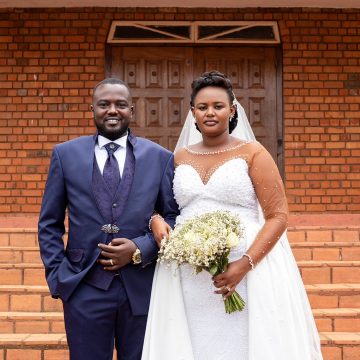“For better or for worse… For richer or for poorer.” This is what most of us promise to our spouse when we pledge ourselves in marriage. But unfortunately, many couples today can’t seem to survive either richer or poorer due to poor money management skills.
Some couples stick with their own individual way of managing money, which may or may not mesh with their spouse’s. Others may take the responsibility all on their own shoulders or shove it onto their spouse instead. Some spouses even lie, cheat, and overspend, and cause all trust within the relationship to be a distant memory. As a newly married couple, how can you prevent these tragedies from happening in your own marriage?
There is definitely hope, but you need to act early. In fact, money management can actually be a rewarding way to bond with your loved one. Here are steps to take and tips to make sure you get on the right track for a lifetime of properly managing your joint finances.
Money Management Steps for Newlyweds
Managing your own money can be challenging enough. But incorporating your spouse’s finances can be overwhelming. In other words, don’t expect to be an expert right away. The two of you have some things to work out and should take plenty of time to do so. Follow these nine steps one step at a time so you and your spouse can easily get accustomed to healthy financial habits.
1. Start Talking About Finances

It’s best to do this before you get married, but if you have not, discuss finances with your new spouse as soon as possible. You’ll need to go over what accounts you have and how much debt you carry. You’ll also want to be clear on how you expect money to be handled.
For example, let your spouse know if you expect him or her to discuss purchases over ugx 300,000 shillings with you first. Make sure each person has a good understanding of where you stand financially as a couple and the expectations that the other holds.
2. Write Down Goals

After you have determined your baseline financial status, discuss your long-term financial goals in-depth. For example, do you plan to retire at a certain age? Do you want to get out of debt and become a millionaire?
My husband and I agreed on goals that included sticking to a budget each month and becoming a one-income family, so that I could be a stay-at-home mom. Make sure to write all of your goals down and review them periodically. You’ll have a much better chance at success if you do.
3. Discuss Bank Accounts

There are both pros and cons to opening a joint bank account or to maintaining your individual accounts after you’re married. You can even do both. Combining accounts can simplify your finances and may help breed trust in a marriage. Moreover, it may be especially valuable when one spouse chooses to take on more household or child-rearing duties than the other and as a result there is inequality in income.
That said, some level of independence may be preferable to you both, though it can also make it easy for you or your spouse to hide certain purchases or spending habits. Plus, given the high divorce rate, keeping separate bank accounts can provide you some measure of protection should your spouse decide to “take the money and run.” Discuss this at length with your spouse to make sure you’re both comfortable with whatever you decide.
4. Build an Emergency Fund

If you don’t already have an emergency fund, consider making this a top priority. An emergency fund is money that is set aside in case something expensive happens unexpectedly, such as a lost job, family illness, natural disaster, or a major home repair. Aim to save about 6 months’ worth of your household expenses in case the emergency is that you have no income. Building an emergency fund should be a priority because it will bring financial security and protect your relationship in case disaster strikes.
5. Design a Budget

As I mentioned, one of my goals with my husband is to ensure that we are within budget each month. So we don’t go into debt, we limit how much we’re allowed to spend in certain monthly budget categories, such as food, dining out, and entertainment.
Start by reviewing your joint expenses over the last few months to determine how much you’ve been spending and if you need to bring that amount down. Then, establish dollar limits per category that you create according to your after-tax income. Don’t forget to allocate for unexpected or irregular expenses, such as routine car maintenance or doctor’s appointments. Your budget may be a work in progress, so don’t worry if you have to make adjustments, especially over the first few months.
6. Track Your Budget
It’s not enough to just make a budget. You need to make sure you stay within your spending allotment and adjust accordingly as your situation, expenses, or income changes. One very effective way to stick to your budget is to use the envelope budgeting system. This is perfect for young couples who typically have lower incomes and must be careful not to overspend.
Another approach is to design a spreadsheet that tracks all your spending and totals it up at the end of the month. You can also make use of certain debit and credit card tools that will breakdown your expenses per category. Just make sure you’re paying off your credit card charges each month. Try out a few different methods and do whatever works best for you and your spouse.
7. Have Weekly Money Meetings
One thing that has really helped me and my husband stay on track is our weekly money meetings. During meetings, we discuss how our budget looks for the month, if we have any upcoming bills to pay, how we are doing with our financial goals, and anything else that is related to money. These meetings are great because they strengthen the communication in our marriage as well as our level of trust. We always know where we stand financially and that we’re both doing our best to keep that on solid ground. Setting aside time to talk also helps us to stop worrying about money because we know that money matters will be dealt with.
8. Save for Retirement
Whether you’re married or not, you need to make sure you are set financially for the long haul. This means you need to save for retirement now. If you work for a company that offers a Retirement benefit plan, put in the maximum amount allowed to take advantage of any company matching, or at least contribute as much as you can afford.
But even if you can’t max out these accounts, even putting ugx 50,000 shs in a month will help you over the long term. Because of compounding interest, time is just as important as money when it comes to growing your retirement fund, so don’t delay.
9. Get Out of Debt and Stay Out of Debt
Debt can be damaging to any one person, but it is a double threat when you’re married because two people are responsible for paying the money back. Start your marriage out right by eradicating debt and not racking it up again. Work out a plan with your spouse on how to get out and stay out of debt. Living a debt-free life is not only healthy for you financially, but it is also healthy for your marriage.
Conclusion
Marriage and money can be tricky, but the best thing you can do is be open and honest. Start off on the right foot by talking about money management and coming up with a solid plan to deal with budgeting, spending, and investing. The sooner you do this, the better. If you form good money management habits as a newly married couple, you’ll be able to work as a team through whatever life throws at you for many years to come.
How do you and your spouse manage money? What are some of the things that have worked best in your situation?
Article: By Casey Slide
Write to editor at : weddings101wire@gmail.com if you have any advice or problem or wedding event that you would like to share. We will be glad to publish your content.

























